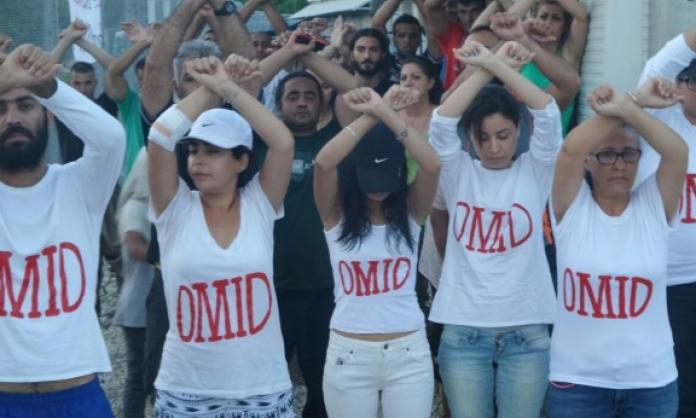“This is how tired we are, this action will show how exhausted we are. I cannot take it anymore.” These were the last words that passed the lips of Iranian refugee Omid Masoumalin before setting himself alight in the Australian concentration camp on Nauru.
The name Omid means hope. But he was stripped of any remaining residue of this when UNHCR representatives visited the Island. According to reports on the ABC, they told the detainees to prepare for another 10 years in this offshore gulag. This is a place where sexual assault is rife and the mental health of children is the worst paediatricians have ever seen among a refugee population.
There is only so much misery people can take. Omid had endured three years in hell with no end in sight despite having been recognised as a refugee in need of protection.
For the political elite in this country, his life was nothing but a game to play for advantage. The worst example of this was Peter Dutton’s macabre attempt to lay blame at the feet of refugee advocates who had raised “false hope” among detainees. No, Mr Dutton, hope was not the culprit. People with hope don’t set themselves on fire.
The government absurdly claims there is adequate medical care on the remote Island. But Nauru’s run-down hospital certainly has no specialist burns unit. There wasn’t even a doctor on hand when Omid arrived.
For two long hours he waited with burns to 80 percent of his body. Horrifying video footage taken at the hospital shows him pacing up and down the corridors screaming in agony. It would take 10 hours for morphine to be administered and an appalling 24 hours before an air ambulance arrived. The delay sealed his fate.
Two days later Omid succumbed to his injuries. He was only 23 years old. The government and the opposition have his death on their hands. As a detainee on Manus, Amir, put it: “Australia has succeeded in eliminating one of their hostages”.
Omid is not the first, nor will he be the last, refugee to be murdered by the Australian government. We must never forget the names of Reza Barati, Hamid Khazaei or Fazel Chegeni. Nor those of Leorsin Seemanpillai and Khodayar Amini who both self-immolated while on bridging visas, the uncertainty of their legal limbo too much to bear.
Could there be anything more ridiculous than politicians who continue to insist they are “saving lives” by meting out such cruelty to those seeking safety?
No. Their policies are deliberately calculated to break the spirit of asylum seekers so that they give up. Some will return to danger and possibly death. Some will drown attempting to cross the Mediterranean instead. Others will take their own lives out of despair.
Omid’s grieving and distressed wife who witnessed his suicide is now being held in a Brisbane hotel, guarded by Border Force agents. She is slated to be removed to Nauru. To prevent knowledge of her whereabouts she has been told to stand away from the windows and is being medicated whenever she cries.
Border Force isn’t taking any chances. In the wake of the stand-off at Lady Cilento hospital to save baby Asha, its officers know we would picket her hotel to prevent her deportation.
There are reports her phone has now been confiscated to stifle her voice. It is even possible the government will bill the family $17,000 to repatriate Omid’s body to Iran. Nothing is beneath them.
The tragedies are not about to end. Within days of Omid’s death another young refugee set herself on fire. This time it was Hodan Yassin, a Somali woman who is thought to be as young as 18. She had been in Brisbane receiving medical treatment before being forcibly returned to Nauru in the dead of the night. At the time of writing, she was fighting for her life.
“How many more people need to die before the government is satisfied?”, asks a detainee on Nauru. There is no easy answer.
Victories are all too rare for the refugee rights movement, but we scored one last week when the PNG Supreme Court ruled the detention of asylum seekers on Manus Island illegal. Its constitution, unlike ours, ensures the human right to freedom from arbitrary detention. Following the ruling, PNG prime minister Peter O’Neill announced the camp would be closed.
This is a welcome development. The government and much of the media have lied for decades about asylum seekers. They’ve been labelled “illegal” for exercise their basic rights. But now it is the government that has been exposed as the violator of laws – illegally detaining asylum seekers for three years in abusive conditions.
The ruling has also rattled Ferrovial, the Spanish company that has taken over the Australian company Broadspectrum, formally known as Transfield, which holds the $1.2 billion contract to run and police the camps. Ferrovial indicated that it has no intention of continuing to run Manus or Nauru in the future.
Now the PNG lawyer that spearheaded the Supreme Court challenge is bringing a compensation case for the 905 men still languishing in Manus. Australia could be liable for the entirety of the compensation bill. The Memorandum of Understanding struck between PNG and the then ALP Australian government in August 2013 states that “all costs” of interning refugees offshore will be borne by Australia. It’s a reminder that the blood of refugees is thick on the hands of Labor politicians.
Compensation cannot bring back Reza Barati or Hamid Khazaei. It cannot bring back the years stolen from these innocent men or repair broken minds. But it will be a blow to the government if it is forced to pay hundreds of millions of dollars. I’m not holding my breath.
In any case we should be under no illusion that another legal setback for the government’s offshore detention regime will inevitably produce a progressive outcome. Each successive crisis has led to a shift to the right in government policy.
Malcolm Turnbull hopes to milk the renewed focus on the refugee issue to his advantage and distract from the drift away from the Liberals.
Turnbull is determined to prove to Liberal Party doubters his capacity for vile sadism. He has said “no-one should be misty-eyed” when it comes to putting refugees through a meat grinder. His words echo a diary entry by Nazi propagandist Goebbels on 14 February 1942: “There must be no squeamish sentimentalism about it”.
Turnbull’s policy – like Labor’s – is indistinguishable from that of Tony Abbott. “I want to be crystal clear on this”, Turnbull said. “Those people at Manus will not come to Australia, full stop … They can go home, they can go back to Iran, they can go back to their country of origin, which some of them have, they can settle in PNG … but we want to keep our borders secure… Our national security has to come first.”
The principle of non-refoulment at the heart of the Refugee Convention, the principle of not deporting recognised refugees to danger, is now a dead-letter.
Other options are being floated.
One is to have an “open-centre” on Manus. The prison gates may open but safety will not be the outcome. The prison walls would merely extend to the rest of the Island. Though given Manus Island hosts a naval base this legal fiction will prove harder to accomplish than on Nauru.
Another is resettlement on PNG, which is already a failed policy. Of the eight people who have been resettled there, an absolutely paltry number, three have returned to the detention centre because they felt unsafe and a further three have been the victims of robbery and assault. The situation is no different on Nauru. Omid had also supposedly been “resettled” on Nauru. The conditions drove him to suicide.
Another possibility is that the government will dump these men on Nauru or Christmas Island. Or there could be an attempt to revitalise the ruse of regional resettlement. The government has already spent $55 million on resettling just two refugees in Cambodia, one of the poorest countries in the region.
The only option ruled out is fulfilling Australia’s responsibility to people that have sought asylum here.
Four Labor MPs have broken ranks with the racist positions of their own party and joined the calls to end offshore processing. It’s better late than never for some. However none of the Labor dissidents are in the shadow cabinet and all are retiring at this election.
The leadership of the ALP remains unmoved. In the familiar race to the bottom, shadow immigration minister Richard Marles is campaigning for Manus to remain open.
In a display of neo-colonial arrogance, he argued that the government should pressure PNG to change its laws to make detention legal and perhaps chuck some more money its way so to do Australia’s dirty work.
But then, why would anyone expect any different from the party that was the father of mandatory detention in the first place and that has now embraced boat turnbacks?
The only hope for justice is to build a movement independent of the major parties. Behrooz Boochani, a Kurdish journalist and political prisoner on Manus who has relentlessly spoken out against the crimes of the Australian government, calls on us all to rise up, to “shout louder and stronger” against the crimes of our rulers, to end the indifference to the violence being meted out.
Every day on Nauru, refugees have been taking collective action. For months, they have gathered together to chant against their incarceration and held banners that point out the hypocrisy of the government: “Don’t stop the boats by killing us in detention”.
As Omid lay unconscious in hospital, they wore t-shirts with his name emblazoned in red paint across the front while they chanted “onshore, onshore”.
As the death toll mounts, could there be any more urgent argument to join these brave refugees in escalating the fight to close the camps, to end this barbaric regime of indefinite offshore detention and to #BringThemHere to Australia so they can live with the support they deserve.









